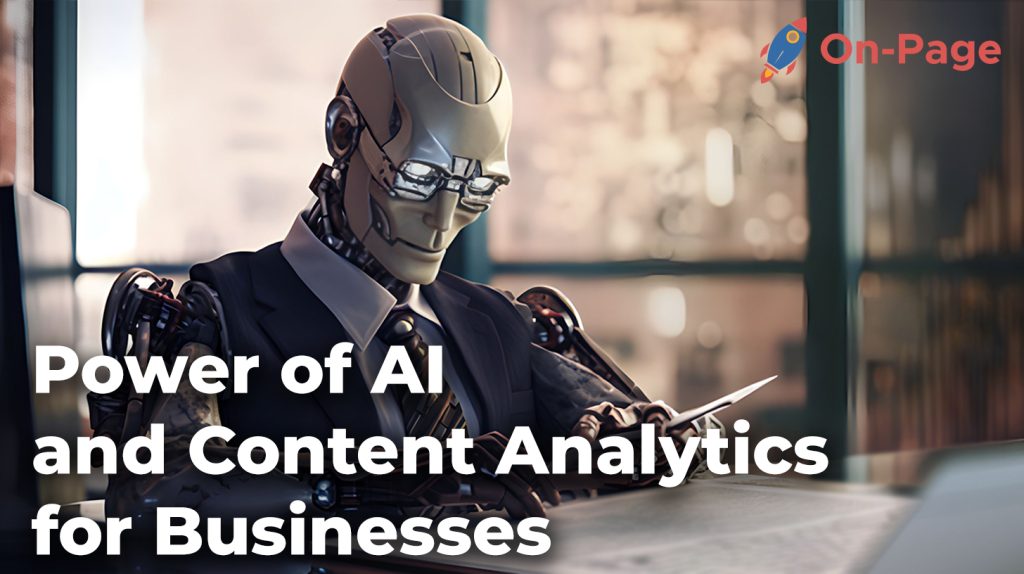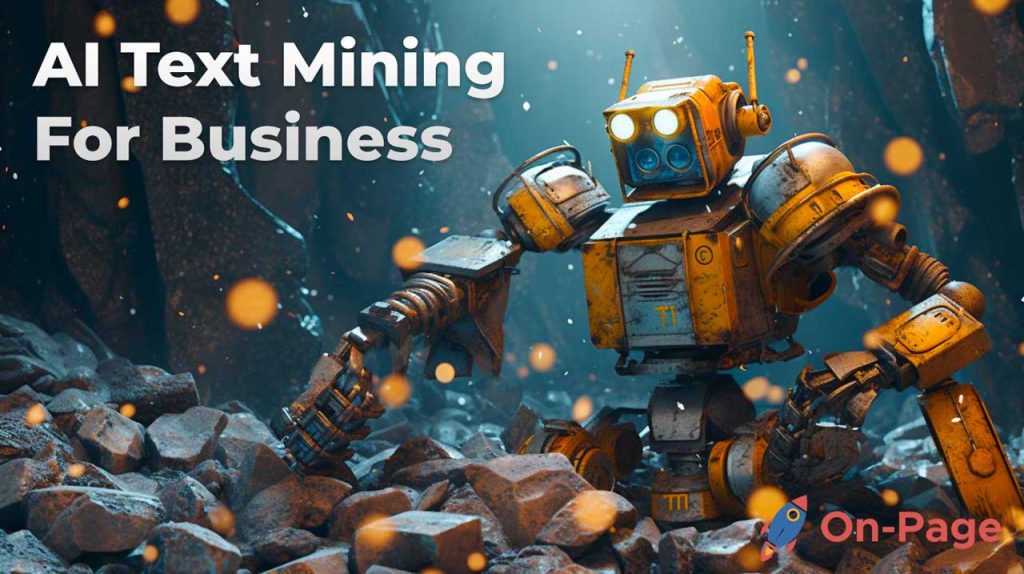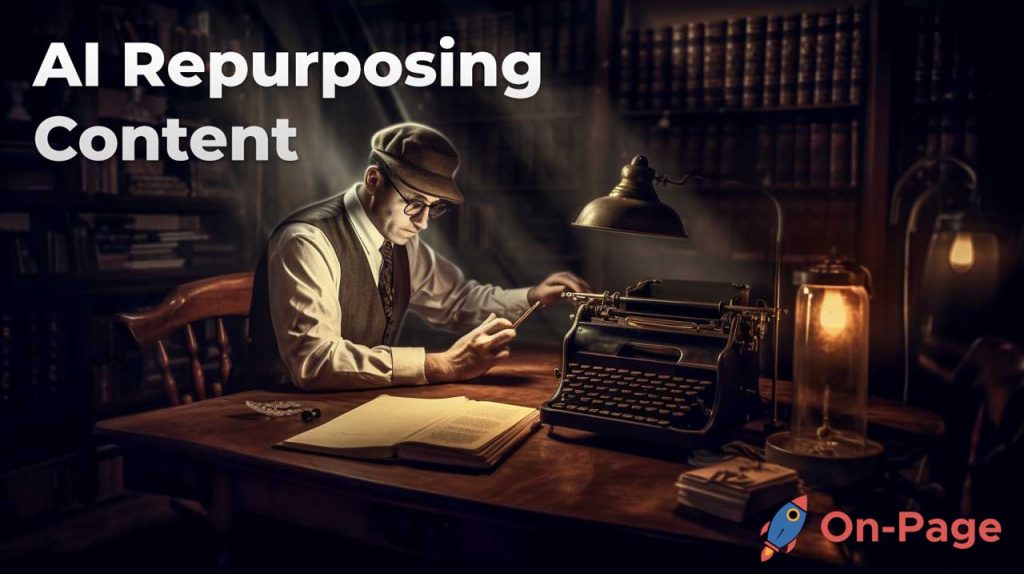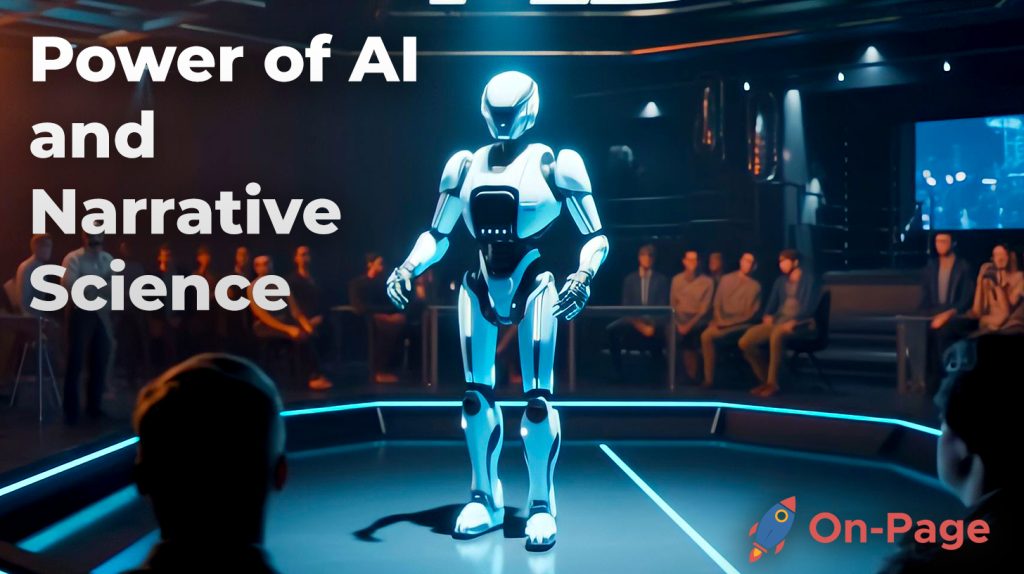
Picture this: a company effortlessly scaling the peaks of SEO, soaring high above competitors with an ever-growing customer base. Sounds like a dream right? What if we told you that this dream is now a reality, achievable by harnessing the unparalleled power of AI and content analytics? Welcome to the future of business optimization, where success doesn’t have to be elusive anymore. Continue reading as we combine artificial intelligence and content analytics to turn dreams into profits.
By combining AI with content analysis, businesses and individuals can gain valuable insights into consumer behavior, market trends, sentiment analysis, and more. The benefits of using AI in content analysis include processing vast amounts of data much faster than a human ever could, identifying patterns and trends in data that might not be immediately apparent to a human analyst; assisting in content creation and curation; and identifying topics and themes that resonate with audiences. Ultimately, the use of AI in content analysis can help improve marketing strategies by optimizing content performance, personalizing recommendations, and achieving better customer experience.
AI and Content Analytics Synergy
Artificial intelligence or AI is rapidly changing the landscape of content analytics. It offers an unprecedented opportunity for businesses to gather deep insights into consumer behavior, as well as to identify patterns and trends and personalize marketing efforts. The synergy between AI and content analytics is undeniable, and businesses that leverage this powerful combination can gain a competitive edge in their industries.

Imagine you’re a business owner searching for ways to improve your website’s ranking on search engines. You’ve tried optimizing your meta titles and descriptions, adding high-quality backlinks, and creating engaging content, but your efforts have yielded only modest results. With the help of AI-powered content analytics tools, you can now analyze your website’s content for keyword density, relevance, and other key factors that affect search engine rankings. By identifying areas to optimize on your pages, AI-enhanced content analysis can help you unlock higher rankings on Google.
One of the key advantages of using AI technology for content analysis is its ability to process vast amounts of data much faster than a human ever could. Traditional methods of content analysis rely on manual curation or text-mining techniques, which are labor-intensive and time-consuming. In contrast, AI can analyze large volumes of data in real time, detect nuances and complexities in language use that humans might miss, and offer actionable insights based on that information.
Some critics argue that relying too heavily on AI-powered content analysis tools can lead to oversimplification or misinterpretation of complex data. They suggest that businesses should continue to rely on human expertise in interpreting nuanced data points such as social media sentiment or customer demographics instead of solely relying on machine learning algorithms.
Think about the relationship between a driver and their car. While automation can make driving easier and safer in certain situations, it’s not enough to guarantee a flawless driving experience every time. Drivers still need to have a strong working knowledge of the rules of the road, best practices for vehicle maintenance, and situational awareness in order to stay safe on the road. Similarly, businesses should approach AI-enhanced content analysis tools as powerful resources that can help them uncover deep insights into their target audiences while also relying on human expertise to ensure accurate interpretation of complex data.
With this in mind, let’s explore some of the specific advantages of using AI-enhanced content analysis tools for businesses.
Enhanced Data Interpretations
Businesses generate vast amounts of data each day, from customer demographic information to social media analytics. However, interpreting these data points can be challenging without the right tools for analyzing and synthesizing them. The use of AI technology in content analytics can help businesses unlock deeper insights into their data by providing a more nuanced understanding of customer behavior and preferences.
For instance, suppose you’re a business owner looking to develop more effective social media marketing campaigns. You’ve gathered large volumes of data on your followers’ activity such as their likes, shares, comments, and other social media metrics. However, you might be struggling to interpret these metrics on a larger scale or to identify patterns in your engagement performance that might lead to higher engagement rates.
This is where AI-powered content analysis comes in. By aggregating all available social media data and analyzing it through machine learning algorithms, AI-enhanced content analysis tools can help you identify key trends in your users’ behavior and preferences, enabling you to create tailored campaigns that better align with their needs.
Another advantage of using AI-enhanced content analysis is its ability to detect previously unnoticed patterns or relationships in complex datasets. By processing vast amounts of information at an unprecedented speed and accuracy level, AI systems can uncover new correlations between seemingly unrelated variables that may reveal deeper truths about consumer preferences or behaviors. This insight can, in turn, help businesses develop more targeted marketing campaigns that resonate with their audience.
However, some scholars and experts warn against the perils of over-relying on AI to interpret complex data. They suggest that while machine learning algorithms can be highly efficient in processing large volumes of information quickly, they may lack the situational awareness and context sensitivity required for a nuanced interpretation of data at a higher level.
The relationship between AI and human expertise in interpreting complex data is like that between a painter and their brush. While a brush is essential for creating works of art, it is not enough on its own to guarantee a masterpiece painting every time. Similarly, AI tools offer powerful resources for analyzing vast amounts of data, but it still requires context-specific knowledge and situational awareness to ensure accurate interpretation.
Despite these challenges, the potential benefits of using AI-enhanced content analysis tools are significant, offering businesses an unprecedented opportunity to gain valuable insights into consumer behavior and trends.
Pattern and Trend Identification
AI and content analytics have the power to identify patterns and trends that would otherwise go unnoticed. With the help of AI, businesses can analyze large amounts of data much faster than humans ever could and uncover actionable insights.

For instance, social media platforms are known for their vast amount of user-generated content. It is impossible for any human to read through every single post and extract any meaningful insights. With AI-powered content analysis tools, businesses can analyze text data in real time and comprehend what their customers are saying about their product or service.
AI algorithms can also detect subtle nuances in customer feedback, which are often ignored by humans. Even though a customer may not directly express dissatisfaction with a product or service, AI can pick up on subtle hints such as sarcasm or disappointment to flag potential issues.
Skeptics argue that relying too heavily on AI and content analytics will result in businesses losing touch with their customers. They argue that automated systems cannot replicate human intuition or empathy. However, AI-enhanced content analysis should be seen as a complementary tool rather than a replacement for human intervention.
Similar to how a doctor uses an X-ray machine to detect hidden internal issues in the human body that are not visible to the naked eye, businesses can use AI-powered content analysis to spot underlying issues within their customer feedback data.
Advantages of AI-Enhanced Content Analysis
AI-enhanced content analysis has several advantages for businesses looking to improve their marketing strategies:
One major benefit of using AI is its ability to analyze large amounts of data quickly and accurately. This enables businesses to stay on top of emerging trends and changing customer preferences without undergoing manual analysis, which can take weeks or even months.
Moreover, AI assists with sentiment analysis by detecting the emotional expressions in customers’ messages. It highlights positive or negative feedback to form a data-driven approach for businesses that help improve their product, service offering, or customer experience.
Critics argue about the cost of integrating AI into content analysis and suggest it is not cost-efficient. They speculate that the human approach to filtering and processing data has been time-tested compared to a new technology-based solution that needs too much set-up. However, the value added from using AI outweighs its initial costs and the technology itself is improving incrementally, making it more accessible.
Comparing AI and human interventions is like using scissors 20 times to cut a paper rather than buying an electric shredder. Although there are costs related to implementation and operation, it adds much more value in terms of speed and efficiency.
Improved Content Marketing Strategies
AI and content analytics offer marketers the power to transform their content marketing strategies by bringing new insights and patterns that wouldn’t be identified through manual analysis. With AI-enhanced content analytics, marketers can get a better grasp of customer behavior, preferences, and patterns that they can use to adjust their marketing strategies.

For instance, AI-powered content analysis helps in creating data-driven buyer personas by understanding customer profile details like demographics, browsing habits, purchase history, and social media engagement. AI algorithms can process vast amounts of data in minutes and show marketer trends and topics that resonate with customers.
By leveraging this data, brands create highly personalized campaigns tailored to targeted customer segments. Personalization has become a potent weapon in the modern digital age where people appreciate being seen as individuals rather than just another consumer.
A perfect example here is Spotify’s Discover Weekly playlist. Spotify leverages AI-powered algorithms to recommend playlists and songs that appeal to users based on their listening history.
However, traditional content analytics methods fall short when it comes to personalization due to the sheer volume of data available and the time taken in analyzing information manually. But with AI algorithms powering the analytics engine, companies have the ability to cut through the noise and focus on what matters most — individualized user experiences.
The powerful combination of AI-powered content analytics makes it easy for businesses to develop data-backed marketing strategies while keeping up with changing customer preferences.
Personalized Recommendations
Personalized recommendations refer to curated content or products recommended to customers based on their previous behavior or interests. Through machine learning algorithms, these systems analyze vast amounts of data or historical interactions with the brand’s channels and provide customized recommendations in real time.
Leveraging AI for personalized recommendations is an excellent way for businesses to engage customers by recommending high-quality services, products, and content that customers will find interesting.
One of the best examples of businesses that have leveraged AI-powered recommendations is Amazon. Amazon’s recommendation algorithm uses machine learning to analyze customer data like purchase history, reviews, and browsing habits to make personalized recommendations for each customer.
Think about it. Wouldn’t you prefer getting customized product recommendations if they are tailored to your interests rather than seeing irrelevant products that you don’t need?
However, some argue that using AI-powered recommendations risks eroding the customer’s privacy. Critics say that businesses use customers’ data to predict their buying habits and serve them with personalized ads.
But in most cases, this presents a win-win situation since AI generates highly relevant content and services while ensuring the company keeps its brand top-of-mind among potential customers.
Personalized recommendations present an incredible opportunity for brands looking to increase engagement and retention rates by providing suggestions based on customers’ profiles. The future of content analytics seems promising, with more businesses leveraging AI to better understand their customers and providing personalized experiences that resonate with them.
Overcoming AI and Content Analytics Challenges
Despite its numerous potentials, AI and content analytics integration still face some challenges:
Lack of Skilled Workforce
One primary challenge slowing down the adoption of AI and content analytics is the lack of skilled personnel to operate the tools. Training is required to use sophisticated programs effectively, and this may prove cumbersome for businesses with limited human resources as it requires a significant level of expertise.
Data Privacy Concerns
Another major challenge that needs attention is data privacy concerns that arise in AI integration. Firms are responsible for ensuring that customer information is safe from data breaches. With AI tools collecting vast amounts of data, there is an increased risk of an accidental breach or misuse, making firms reluctant to share vital information with outside companies.
Shortcomings in Application
While AI technology has made giant strides in various industries, there’s no guarantee that the processes integrating these technologies will yield desired results. For instance, flawed analysis can lead to inaccurate predictions or recommendations. There is also a certain level of mistrust growing around biased algorithms that could distort datasets and give results swayed by personal affiliations. An accurate interpretation is only possible when combined with human judgment.
Businesses have become dependent on data-driven decision-making, as it gives them a competitive edge when it comes to strategy formulation. Despite the few shortcomings mentioned earlier, integrating AI into your firm’s content analytics processes has enormous benefits.
Future Outlook of AI in Content Analytics

The future of content analytics is undeniably tied to the integration of AI technologies. Below are some ways we believe AI will shape this field moving forward:
Greater Efficiency
In 2023, more companies will integrate artificial intelligence technology due to its efficiency and ability to process vast amounts of data. SEO optimization tools like On-Page.ai can help create briefs and outlines, suggest keywords, and write content effectively, tasks that would be time-consuming for an individual to achieve.
More Advanced Analytics
As the capabilities of machine learning continue to evolve, AI and content analytics tools will advance. Currently, these tools identify patterns and trends in data sets to make recommendations. Enhanced AI technologies in the future will enable more complex analysis such as predicting changes in consumer behavior based on past trends, effectively saving time and increasing accuracy.
Greater Personalization
One exciting development will be personalized customer experiences. As data collection becomes more refined through AI technology, businesses can build profiles of their customers with deeper insights into interests, pain points, and preferences. This information enables companies to build targeted marketing strategies for prospective and current customers that feel natural and less like an advertisement.
AI Usage in Numbers
The progress made within the field of AI and content analytics is significant, as seen from the numerous benefits they provide businesses. While no one can predict exactly what the future holds for AI adoption in content analysis, it is clearly here to stay.
- A 2018 global survey by SAS, Accenture, and Intel, which included insights from executives, revealed that 72% of organizations globally are now using AI in business.
- According to MarketsandMarkets, the AI-based natural language processing (NLP) market is expected to grow from $15.7 billion in 2022 to $49.4 billion in 2027, with a significant portion attributed to content analysis applications.
- A study conducted by MIT Technology Review Insights found that among surveyed marketers, 59% reported using AI/analytics tools for analyzing content performance and optimizing their marketing strategies.
With AI-powered tools like On-Page.ai, your business’s content optimization process should be easier and more efficient.
Responses to FAQs
1. Can AI replace human analysis in content analytics?
The short answer is no, AI cannot completely replace human analysis in content analytics. While AI certainly has remarkable capabilities to process and analyze massive amounts of data, it still lacks the contextual understanding, creativity, and critical thinking skills that human beings possess.
According to a recent study by Forrester Research, only 12% of businesses believe that artificial intelligence can fully replace human decision-making or analysis. Furthermore, a survey conducted by Deloitte found that 62% of executives believe they will need to retrain or redeploy their workforce due to the integration of AI and automation.
AI is best utilized as a complementary tool to support human analysis rather than a replacement. Human analysts can use AI-generated insights to supplement their own knowledge and expertise, ultimately resulting in more accurate and meaningful results.
In conclusion, while AI is undoubtedly revolutionizing the way we approach content analytics, it cannot replace the nuanced and complex thinking of human analysts. By combining the strengths of both humans and machines, businesses can unlock the full potential of content analytics.
2. What are the applications of AI in content analytics?
The applications of AI in content analytics are vast and varied. For a start, AI-powered content analytics tools can assist companies in understanding their target audiences better. By analyzing consumer behavior patterns and preferences, AI algorithms can recognize emerging trends and anticipate upcoming demands. According to a report by MarketsandMarkets, the global AI market for the media and entertainment industry is expected to grow from $1.4 billion to $3.6 billion by 2022.
AI in content analytics also helps businesses identify areas where they can optimize their content marketing strategies. For instance, AI algorithms can determine which types of content perform well on various platforms and advise companies on how to tailor their content accordingly. The Content Marketing Institute’s report states that 73% of B2B marketers use content marketing to promote their brand.
Moreover, AI assists in measuring the effectiveness of content in terms of ROI. By tracking metrics such as page views, click-through rates (CTR), engagement rates, and conversions, AI algorithms can calculate the exact cost per acquisition (CPA) for each advertisement campaign. With this information at hand, businesses can quickly adjust their marketing budgets in response to real-time data.
In summary, the applications of AI in content analytics are multiple, ranging from audience insights and optimizing content marketing strategies to measuring ROI accurately. As such, incorporating artificial intelligence into your business is no longer just an option. It’s essential if you wish to remain competitive in today’s fast-changing landscape of digital marketing.
3. What specific industries are utilizing AI for content analytics?
AI and content analytics have been implemented across a variety of industries, from healthcare to retail. In fact, according to a recent report by MarketsandMarkets, the global market for AI in the healthcare industry is projected to reach $102.7 billion by 2028.
In the financial sector, AI-powered content analytics is playing a crucial role in detecting fraudulent activities. Research conducted by Accenture states that banks utilizing AI technology can reduce false positives by 30% and save up to $27 billion annually on compliance costs.
Retailers are also utilizing AI-powered content analytics to enhance their customer experience. By analyzing customer purchase data, online retailers like Amazon can provide personalized product recommendations and offer targeted advertising. In addition, by tracking social media conversations retailers can understand consumer needs and preferences in real time. In fact, according to a report by Zion Market Research, the global market for AI in retail is expected to reach $23.6 billion by 2025.
Overall, industries of all kinds are realizing the immense potential of AI in content analytics for optimizing internal processes and improving customer satisfaction.
4. How does AI enhance content analytics?
Artificial intelligence has revolutionized the way businesses conduct content analytics by providing them with a new set of tools and techniques to gather insights from their data. The primary advantage of using AI in content analytics is its ability to analyze vast amounts of data at lightning speeds, which would be impossible for humans to perform manually.
AI can also identify patterns and correlations within the data that may be difficult for humans to detect, allowing businesses to uncover valuable insights that were previously hidden. For example, AI-powered sentiment analysis can quickly analyze customer feedback across various channels such as social media, reviews, and emails, and provide businesses with invaluable feedback on what customers like or dislike about products.
AI’s ability to learn and adapt makes it an ideal tool for content analytics in dynamic environments. As new data is generated, AI algorithms can update their models accordingly, ensuring that businesses always have access to the most up-to-date insights.
According to a report by MarketsandMarkets, the global AI market size is expected to grow from $21.5 billion in 2018 to $190.6 billion by 2025, at a CAGR of 36.6% during the forecast period. This growth is primarily due to the increased demand for AI-powered solutions in various industries such as healthcare, finance, retail, and others.
In conclusion, AI has significantly enhanced content analytics by providing businesses with faster and more accurate insights while reducing costs associated with manual analysis. With the continued growth of the AI market, we can expect even more innovative applications of this technology in content analytics in the coming years.
5. What are the future developments in AI-driven content analytics?
The future developments in AI-driven content analytics are undoubtedly promising. As AI technology continues to advance, businesses can expect content analytics tools to become even more sophisticated and effective in delivering insights.
One significant development to watch for is the integration of natural language processing into content analytics tools. With NLP, businesses can analyze written and spoken language, allowing them to extract meaning and sentiment from unstructured data sources like customer reviews and social media posts. This will enable a better understanding of customers’ wants and needs and result in improved products, services, and experiences.
Another area of growth is machine learning algorithms that can predict consumer behavior accurately. According to Deloitte’s State of AI in the Enterprise report in 2020, 55% of companies employing AI reported moderate or significant revenue increases. Machine learning algorithms analyze customer data leading to accurate predictions of purchase decisions thereby optimizing marketing campaigns.
Moreover, AI-based predictive analytics can identify new business opportunities by analyzing real-time data at an accelerated rate.
In conclusion, by adopting advancements such as NLP and predictive analytics in their content analytics strategies, companies stand a chance to optimize marketing campaigns resulting in better ROI.
Sign up to On-Page.ai and discover how AI-powered tools can boost your content optimization strategies.




